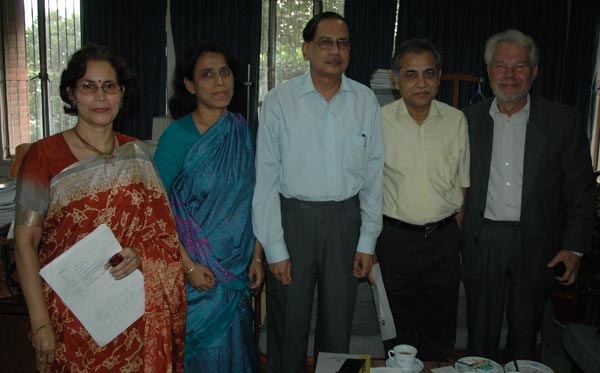SWEDISH SOUTH ASIAN STUDIES NETWORK
Visit to the Bangladesh Institute of Development Studies (BIDS),
Sunday 4 December 2005
 |
| Rita Afsar, Rushidan Islam Rahman, Omar Haider Chowdhury, Quazi Shahabuddin, and Staffan Lindberg, at the meeting held at Bangladesh Institute of Development Studies, BIDS. |
Web page:
http://www.bids-bd.org
On Sunday afternoon we visited the Bangladesh Institute of Development
Studies, BIDS, located in Agargaon, Sher-e-Bangla Nagar, in the southwestern
part of Dhaka. This was our second visit to BIDS, the first time was during
SASNET’s contact journey to Dhaka in 2002, when we met a large number
of researchers. Read our report from the 2002
visit.
Dr. Rita Afsar, our host in Dhaka,
is a Senior Research Fellow at BIDS (and also a member of SASNET’s
South Asian Reference Group) and she had again invited us to the Institute.
Since many years she is personally involved in research collaboration
with Swedish colleagues, among them Dr. Alia Ahmad,
Dept. of Economics, Lund University. Together
they convened a panel, nr 20 on ”Rural Livelihood and Social
Capital: The Case of Bangladesh and South Asia” at the 18th
ECMSAS conference organised by SASNET in Lund in July 2004 (more
information on the panel).
This time Dr. Afsar had arranged for an exchange meeting with her colleagues at BIDS. It was held in the office of Dr. Omar Haider Chowdhury, one of the five research directors of BIDS. The Director General Dr. Quazi Shahabuddin, the research director Dr. Rushidan Islam Rahman, and Dr. Afsar were also present.
The Bangladesh Institute of Development Studies is a multi-disciplinary
organisation for policy-oriented research on development issues and dissemination
of information through books, publications, web site and seminar programs.
Among the research topics on the agenda are poverty and inequality, international
trade, agricultural development, food security, micro-credit, industrial
development, health, nutrition, education, water resources management,
environment, gender, migration and urbanisation. Currently 13 senior research
fellows, 19 research fellows and 11 research associates are connected
to BIDS.
In the call for the meeting, it was mentioned that one important objectives
of the meeting was ‘to deepen relations between BIDS and relevant
universities and research institutions in Sweden for possible future collaboration
including visiting scholarships, guest lecture tours, etc.’
The expectations were therefore high on us to deliver concrete suggestions
on how to reach these goals, and after our presentation of SASNET we were
hard pressed to answer what has happened since our last visit to BIDS
in 2002. They mentioned as a model a previous research collaboration that
BIDS had with Christian Michelsen Institute
in Bergen, Norway, involving visiting fellowhips and joint research projects
(contact person at CMI is Dr. Arne Wiig).
We explained the very different role of SASNET, not being a research
institute but a network and a facilitator bringing Swedish and South Asian
researchers together. We offer planning grants to new collaborative research
projects, but the contact between partners must be established independently
from SASNET, even though we may assist in bringing partners together (and
our web site gives much information about possible research partner institutions
at Swedish universities).
Dr. Rahman still asked for initiatives coming from Sweden, and Staffan
promised to come up with ideas based in our knowledge about what kind
of South Asia related research in social sciences that are there in Sweden.
He mentioned the research on good governance and corruption, done by the
Dept. of Government, Uppsala University,
and will find out whether BIDS could become involved in this, especially
since BIDS plans for a conference/seminar on good governance to be held
in Dhaka in March 2006. The conference is organised by Dr. M.
Asaduzzaman.
Another connection that already exists with Sweden is Dr. Malin Arvidson at the Dept. of Sociology, Lund University. She defended her doctoral dissertation on ”Demanding Values. Participation, Empowerment, and NGOs in Bangladesh”, in March 2003, and is now working on a project on ‘Institutions and livelihoods: Perspectives of change in rural Bangladesh,’ in close contact with BIDS.
The origin of BIDS dates back to 1959, when it was founded in Karachi as the Pakistan Institute of Development Economics (PIDE). In 1970, the Institute was moved to Dhaka, and after the country's independence in 1971 it became the Bangladesh Institute of Development Economics (BIDE), with a mission to address the development problems confronting the newly independent nation. In order to better reflect this broadened research focus, the name was changed again in 1974 to Bangladesh Institute of Development Studies.
SASNET - Swedish South Asian Studies Network/Lund
University
Address: Scheelevägen 15 D, SE-223 70 Lund, Sweden
Phone: +46 46 222 73 40
Webmaster: Lars Eklund
Last updated
2011-04-27
